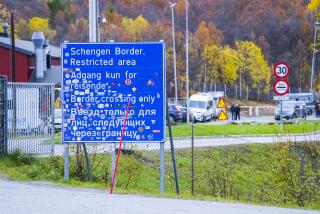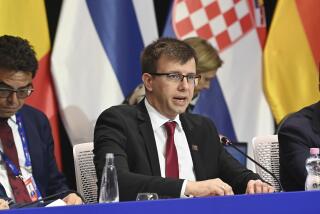EU Expansion Refurbishes the Iron Curtain
- Share via
UZHHOROD, Ukraine — The new Europe lies tantalizingly close to Tamila Vasilchenko -- so close she can walk through a bleak border post to sell candy on a dusty roadside in neighboring Slovakia.
Yet what soon will be the European Union’s most far-flung corner might as well be an ocean away. Ukrainians such as Vasilchenko, 59, a retired teacher struggling on a meager pension, can cross over to Slovakia a few times a month, but they can’t stay.
They’re shut behind a new Iron Curtain -- a 2,400-mile economic frontier separating the former Soviet Union from the newly expanded EU and the stability and prosperity it represents.
“Sometimes I don’t pay the electricity or water bills for months because I don’t have enough money,” Vasilchenko said. “I have to come here to sell something in order to have a better life.”
That last resort could disappear May 1, when Europe crowns its most significant geopolitical shift since World War II by making EU members of eight former communist countries (plus Cyprus and Malta, which were never in the Soviet orbit).
Enlargement brings the EU right to the doorstep of the turbulent Balkans and the former Soviet Union, raising troubling security issues as the bloc rushes to tighten borders against traffickers and terrorists.
The old Iron Curtain was a Cold War border from the Baltic Sea to the Mediterranean consisting of minefields, attack dogs, tanks, concrete barriers and sharpshooters perched in towers. The new divide is draped with its share of barbed wire, but it’s far more high-tech -- computers linked to national and Interpol databases help guards decide who comes and goes.
Both borders, however, share the same goal: to keep the easterners securely in the East.
Already awash in immigrants and rising xenophobia, the EU is determined to avert an onslaught of cheap labor even as it reaches out, ever eastward, to court new corners of the continent.
The new frontier also threatens to further isolate Russian minorities already floating in a nationality limbo.
“Nobody takes us into account. We are an empty spot,” said Vera Altonina, 63, an ethnic Russian pensioner selling flowers on the streets of Riga, Latvia’s capital, where she lives and works without citizenship.
“During Soviet times, there were no non-citizens and citizens. We were one big country, and nobody cared whether you were Russian or Latvian,” she said. “Joining NATO and the EU was not our decision. The government never asked us. Now, we are isolated from Russia completely.”
The expansion pushes the EU into a potentially rough neighborhood: Just over the new borders are Belarus, Croatia, Romania, Russia, Serbia and Montenegro, and Ukraine.
Across the Baltics and in Hungary, Poland and Slovakia, border controls are being strengthened, not loosened.
EU headquarters in Brussels has spent hundreds of millions of dollars to help the newcomer nations buy aircraft, snowmobiles, night-vision goggles, scanners and computers.
During the Cold War, the 61-mile Slovak-Ukraine border was under Moscow’s sway and few people had the means or permission to travel.
Today, the border is virtually impenetrable, patrolled by 500 highly trained Slovak guards, searching Ukrainians and their vehicles and wandering through nearby fields and forests.
Ukraine lies on the ancient Silk Road, a major route for smugglers bringing heroin and illegal immigrants from Central Asia to Europe.
“Before, we were in the East. Now we’re about to switch to the other side, and we can’t take any chances,” said Deputy Col. Miron Vojtasek, Slovakia’s second-in-command for the frontier, fidgeting at his desk and sighing heavily as the phone rings every few minutes.
“We’re protecting the outer border of Europe.”
The need for tight security became apparent late in March when Ukraine’s Defense Ministry disclosed that several hundred Soviet-built missiles were missing from the nation’s arsenals, raising concerns that they might reach terrorists.
In February, border guards stopped a man crossing into Hungary with nearly a pound of uranium. It was unclear whether the uranium was in natural form or had been enriched for weapons use.
Similar vigilance is evident along Poland’s long border with Russia. In the Soviet era, crossings were spaced roughly 60 miles apart. Now there are manned checkpoints every 13 miles.
Poland, which began building new stations in 1997, has 16,000 border guards and will hire 5,300 more by 2006, said Jaroslaw Zukowicz, a border security spokesman.
In October, Poland introduced visas for Russians, Belarussians and Ukrainians. Cross-border traffic and small trade initially almost stopped, but the flow of vehicles and “suitcase merchants” hawking cheap cigarettes and other goods has resumed.
In the Baltics, where the border with Russia was mostly an administrative one until the collapse of the Soviet Union in 1991, barbed-wire fences now run through thick forests, police boats patrol border rivers and lakes, and modern customs offices dot main highways to Russia and Belarus.
The Kremlin is unhappy that the Baltic states, which it long viewed as its own backyard, have joined the EU and NATO. Baltic officials have tried to assure them that everyone in the region will be more secure.
But across the ex-communist East, there are doubts about the integrity of poorly paid border guards. Gunars Dabolins, who heads Latvia’s border police, dismissed allegations that his department was rife with corrupt guards willing to wave through contraband in exchange for cash.
Even so, “we are establishing a criminal department in the border service because we realize that the pressure from [Russia and Belarus] is going to be big and there will be attempts made by organized crime to bribe them,” Dabolins said.
There’s more to the new Iron Curtain than security issues.
The EU expansion cuts off Russia from Kaliningrad, its westernmost enclave, and risks deepening the isolation of the Russian minorities in Latvia and elsewhere.
“When I go to Russia, they tell me I’m not Russian. When I’m in Latvia, they tell me I’m not Latvian,” said Slava Vyacheslavs, 63, who left Russia on foot for Latvia at age 4 in 1944 and has yet to be granted citizenship.
“I get a measly little pension in Latvia, so I’ve got to stay here,” he said. “So let it be Europe -- maybe that will be better for me.”
More to Read
Sign up for Essential California
The most important California stories and recommendations in your inbox every morning.
You may occasionally receive promotional content from the Los Angeles Times.













